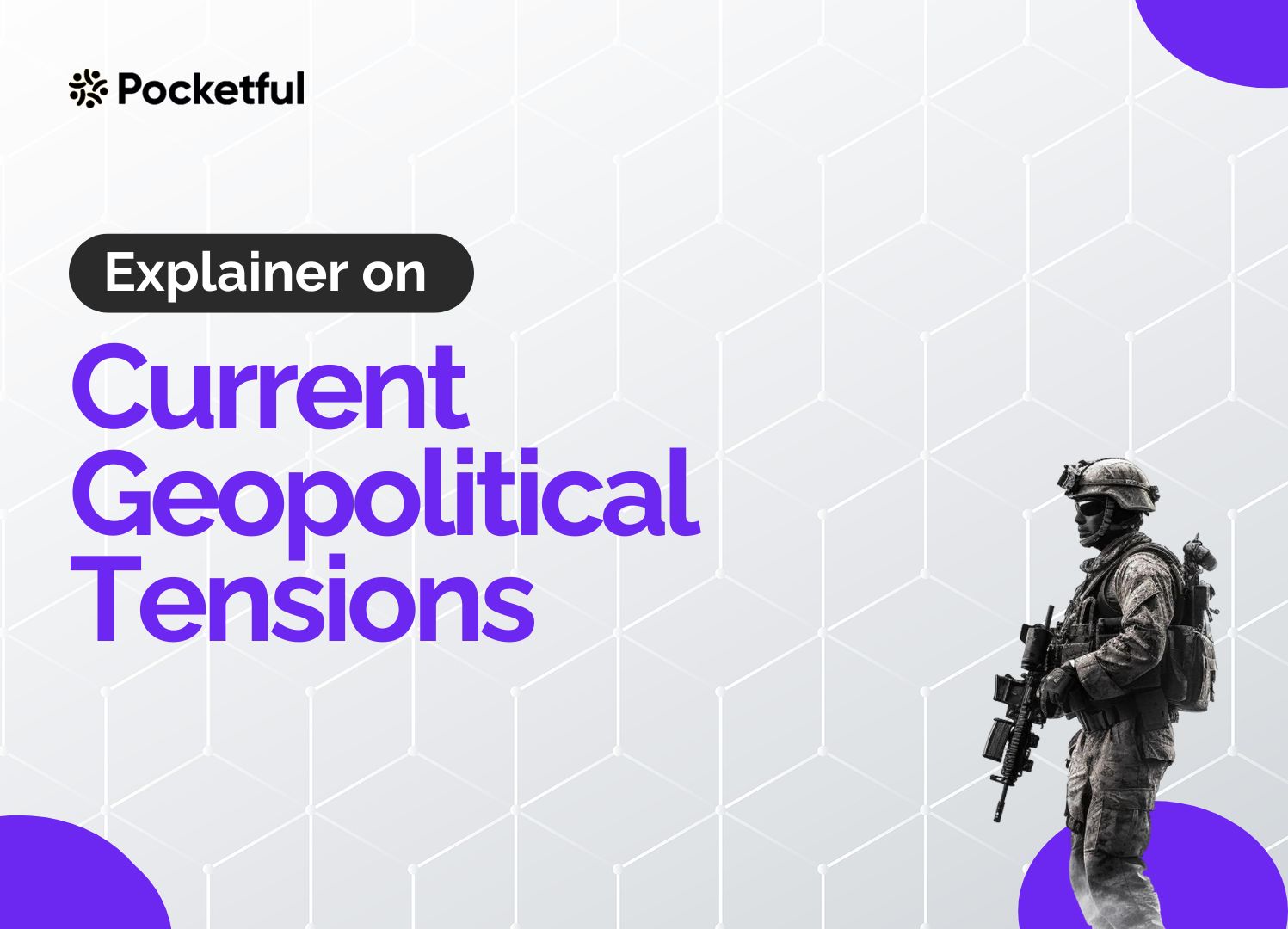| Type | Description | Contributor | Date |
|---|---|---|---|
| Post created | Pocketful Team | May-20-24 | |
| Add new links | Nisha | Feb-24-25 | |
| Add new links | Nisha | Feb-24-25 |

- Blog
- geopolitical tensions
Explainer On Geopolitical Tensions

You enjoyed a delicious dinner last night and woke up this morning to the news of one nation launching an airstrike against another. Your first thought might be about how these geopolitical tensions will impact the stock markets and your portfolio.
In this blog, we will give answer to all such questions; keep reading to find out.
Geopolitics refers to the political interactions between countries and regions. Now, geopolitical tension, as the term suggests, relates to conflicts or political concerns between two or more countries.
What is happening around?
Geopolitical tensions are not new. They occur frequently, whether through major events or smaller incidents around the world. Things can get messy when we struggle to understand how these situations impact the global markets or, say our Indian stock market.
If we take the recent case, Iran’s consulate in Damascus, Syria, was destroyed by Israel in the early hours of April 1, 2024, killing eight Iranian officers, including a senior member of the Iranian Islamic Revolutionary Guards.
Following the assault, Iran directly attacked Israel with about 300 drones and missiles in retaliation. Subsequently, Iran intercepted a container ship near the coast of the United Arab Emirates, alleging it had ties to the Zionist dictatorship in the Gulf.
This prompted a military intervention by the United States, the United Kingdom, and France to intercept some Iranian missiles, a move that signals an escalation of hostilities between Iran and Israel, as well as a reaction from the G7 and UN Security Council.
Because of this, the global markets fell around 2% in a single day.
Impact of the Geopolitical Tensions

Crude Oil Prices
The price of oil will be directly impacted in case of geopolitical tensions. Crude oil prices can exacerbate market uncertainties.
Investors can closely watch the oil prices. The Middle East countries—Iran, Saudi Arabia, and Iraq, for example—produce over 36% of the world’s oil and hold roughly 52% of its reserves.
Did you know
Israel and Iran combined produce around 4.1% of global production of oil, roughly around 3.8 million barrels per day.
Supply Chain Disruption
War scenarios significantly influence imports and exports. Maritime chokepoints like the Red Sea and the Strait of Hormuz pose significant risks to international trade and economic stability if the situation worsens. The commerce routes could be negatively impacted by any disruption to these channels.
Inflationary Conditions
Increased oil prices would cause inflationary conditions to grow, and the government might implement harsh measures to manage those conditions. Furthermore, if the central banks take a cautious stance in reaction to unstable market conditions, the possibility of interest rate reductions may be further postponed.
Indian trade with Israel and Iran
India’s import and export of goods to Israel totalled approximately 2.3 billion USD in FY 23 and 8.4 billion USD in FY 24. The country’s top exports to Israel were diesel (worth 5.5 billion USD) and polished and cut diamonds, which were estimated to be worth 220 million USD.
India mostly imports petroleum ($85 million) and methanol ($176 million) whereas its main exports to Iran are rice ($1.03 billion) and organic chemicals ($113 million).
What should Investors do?

In Geopolitical tensions, there are a number of scenarios that could occur, such as correction in equity markets, rise in inflation, trade delays, import-export misbalance, etc. A protracted conflict situation would negatively affect the global economy and could cause each country’s GDP to drop by 1% to 2%. In such a scenario, the market may correct sharply, perhaps by more than 10%.
Any investor with a longer investment horizon needs to view such circumstances as a chance to build wealth over time. Further, it would help if you build your portfolio based on your risk tolerance. For example, when it comes to the equity asset class, small and mid-cap stocks will be the most volatile during any correction. If you want to be extra cautious, you can move toward large-cap stocks, which are thought to be more defensive during market downturns.
On the other hand, as the conflict intensifies, inflation will rise, which can raise
Every market correction should see the gradual deployment of fresh money, with some tactical calls also being taken into account.
Read Also: Explainer on Portfolio Management Services (PMS)
Conclusion
In summation, geopolitical tensions are nothing new; they occur regularly around the world. One can keep an eye on events involving the USA as there’s a great saying, ‘When America sneezes, the world catches a cold”.
Regarding the Israel and Iran case, the Indian stock market may have a knee-jerk reaction in response to the increasing tension between Israel and Iran, as this could result in an increase in crude oil prices and ultimately widen India’s trade deficit.
Investors should view corrections as a chance to build wealth by investing extra capital in such times, rather than panicking and liquidating their holdings. Further, it is wise to get in touch with your financial advisor before making any investment decision.
Frequently Asked Questions
What happened between Iran and Israel on 1 April 2024?
Israel launched an airstrike on Iran on 1 April 2024, killing 8 Iranian officers in the process. Iran responded by attacking Israel with more than 300 airstrikes, which exacerbated the situation and brought on a state of war.
What are the major sectors that will be impacted by the Iran and Israel war situation?
The primary industries that will be impacted by the conflict between Iran and Israel are oil, gas, and energy
How could India play a role in mediating or de-escalating the tension situation between Israel and Iran?
India has the ability to defuse the situation by supporting diplomatic efforts and peaceful conversations, as well as by offering relief and support to those in need.
Could a disruption in the shipping route in the Gulf region will affect India?
Yes, a disruption in the shipping route will impact the Indian economy, as the Persian Gulf is an essential route for India’s oil imports. A significant portion of crude comes from this route, and any disruption will affect India’s energy sector.
Does Israel have nuclear weapons?
As per intel agencies, Israel has nuclear weapons, but officially, the country is denying that it does not possess nuclear weapons.
Disclaimer
The securities, funds, and strategies discussed in this blog are provided for informational purposes only. They do not represent endorsements or recommendations. Investors should conduct their own research and seek professional advice before making any investment decisions.